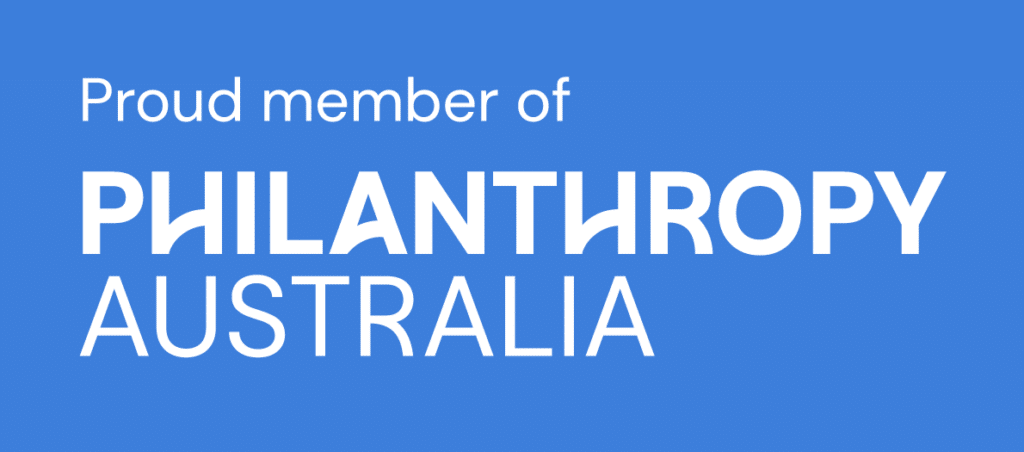- Aimee learned to love herself again
- The language of addiction: How words shape and influence people
- Do you know how important it is to have a legal Will?
- The first steps into a new start
- From the GM, Helen Connealy
- A warm and welcoming gesture
- Celebrating the resilience of young people
- Without a home

In this Impact Spring 2022 edition:
Aimee learned to love herself again
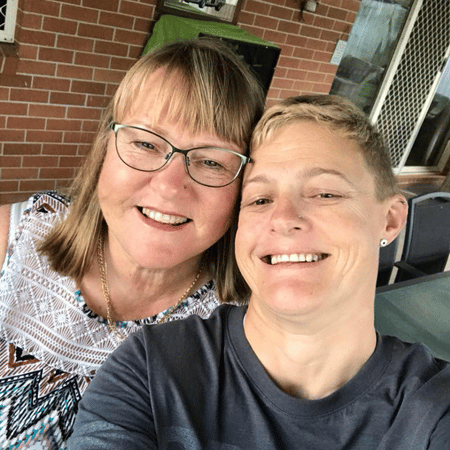
Aimee has faced several traumatic events and broken relationships throughout her life. After witnessing her close friend’s death and navigating tumultuous family relations, Aimee’s experiences sent her down a difficult path of addiction and mental illness at the early age of 23.
Hanging onto a thread, Aimee yearned for a chance, a way to rebuild self-esteem and relationships, especially with her mother. During her hardest times, Aimee took comfort with a couple whose son had recently overcome addiction himself at Triple Care Farm. Upon hearing the young boy’s positive remarks about the Farm, Aimee was keen to apply and was welcomed into the program aged 24.
During her time at Triple Care Farm, Aimee benefited from the nonlinear healing process to overcoming addiction and shared the impact that staff and services provided had on her journey and her troubled situation. Aimee felt a sense of ‘unconditional love’ from all the staff and was unable to fault any aspect of their support at the Farm. As months progressed in the program, Aimee had a compassionate and supportive connection with the Residential Workers, particularly a staff member who went by the name ‘Farmer Tom.’ Tom was like an adopted grandfather. He and the other staff supported Aimee ‘into learning how to love herself again, emotionally and psychologically,’ which helped immensely when striving for recovery.
Aimee spent her time at the Farm investing in her future, by acquiring her Trade Apprenticeship in Aged Care. Since graduation all those years ago, Aimee has remained in touch with staff at Triple Care Farm and the Foundation. She often reflects on her time in the program. Through the holistic programs and individualised support and care from Triple Care Farm, Aimee has been able to turn her life around, achieving a sense of hope and opportunity.
Whilst getting ahead in her career and personal relationships, Aimee has also stayed in active recovery for over 15 years. Now 38, Aimee looks back on her time at Triple Care Farm as
‘a tough time, but such an important time for me.’
Aimee is a resilient woman, and can manage her mental health and a full-time job at an aged care facility on the Sunshine Coast. She has further found joy in her rebuilt relationship with her parents and friends. Aimee’s partner and children have become her biggest support system.
Aimee enthusiastically claims to ‘be in the best place she’s ever been’ and remains a dedicated supporter of Sir David Martin Foundation and our mission to help young people in crisis. It is people like you who make success stories like Aimee’s possible. Thank you for your continued support and the opportunities you provide for young people.
The language of addiction: How words shape and influence people

Undeniably, words have power. Our brains produce a powerful response to language, with each word triggering a thought, then an emotion, which ultimately leads to an action or reaction. Language and labels carry even more weight for people who are already vulnerable, marginalised, and struggling. When a young person is working to overcome their addiction, the language we use can either help or hinder their recovery.
Consider the implications of the phrase ‘getting clean.’ This terminology suggests that a person with a substance use disorder is unclean or dirty, which contributes to stigma, shame, and a negative self-image. This can have ongoing impact leading to continued substance use, rather than recovery. No one should be shamed into overcoming their substance use; it must be their choice. Young people need to feel empowered and supported to overcome their battle, rather than shamed and ostracised.
So how can we help?
Addiction needs to be reframed as a health issue and treated with the same care and concern that we would approach any other health issue. It is important to remember that we have a choice in how we communicate.
Substance abuse is a problem that is increase their impact on young people. Inevitably made worse by stigma. When discussing these topics, we ask that you think about the weight of your words. Consider how specific language can lend itself to healing or worsen the damage of addiction. Remember to recognise the person first before we address the substance use disorder.
Helpful language replacements
-
- ‘Person struggling with substance use disorder’ instead of ‘addict’ or ‘junkie’
- ‘Opioid use disorder’ instead of ‘drug addiction’
- ‘Alcohol use disorder’ instead of ‘alcoholism’
- ‘In treatment’ instead of ‘getting clean’
- ‘Person who is no longer using substances’ instead of ‘sober’
- ‘Individual with alcohol use disorder’ instead of ‘alcoholic’
- ‘Individual with drug use disorder’ instead of ‘drug addict’
- Alcohol and other drugs (AOD) instead of naming of ‘the drug of choice’ (DOC)
*With thanks to peak body NADA for their ongoing research and de-stigmatisation efforts.
Do you know how important it is to have a legal Will?

Without one, a probate court takes over the distribution of your assets and you have no choice. Gifts in Wills (also known as Bequests) have always played an important and valuable part in Sir David Martin Foundation’s fundraising.
Many of our loyal donors – people who trust us and believe in our work, have chosen to leave a gift. They tell us that it’s a way to reflect their life story and values, leaving a legacy that will live beyond them and achieving a bit of immortality.
Their generosity is enhanced by the fact that they probably won’t see the benefits – a bit like planting a tree that will provide shade to people you’ll never meet.
Leaving a gift to a charity in your Will supports a cause that has been important in your life. Family and loved ones always come first and it is important to talk to them about your wishes, but once they are looked after, it’s rewarding to leave a gift and it is invaluable to the charity.
Sir David Martin Foundation is putting the finishing touches to a Bequest Recognition Board at David Martin Place Withdrawal unit onsite at Triple Care Farm. We are thrilled to be able to publicly acknowledge our donors’ commitment and dedication. A gift in your Will continues the love and generosity you have shown in your lifetime even after you have gone. It’s a wonderful thing to be remembered for. If you are interested in leaving a gift in your Will or to find out more about how you can leave a legacy for future generations, please contact Anna Beaumont at a.beaumont@martinfoundation.org.au
The first steps into a new start

Jade’s young life took a turn for the worse when an extremely traumatic event happened where she was living. She turned to substances to help her cope with the ongoing pain of the experience.
Thankfully, Jade heard of Triple Care Farm and she applied for treatment for her Alcohol and Other Drugs substance dependency. Jade started at David Martin Place withdrawal program onsite at Triple Care Farm and continued her journey to the residential rehabilitation program, totalling a successful four month stay.
We often say that the challenging work begins when students leave the safety and security of the Triple Care Farm program. Transitioning to a fresh start can be one of the most difficult parts of the recovery journey.
During this time, Jade met Linda, an Aftercare worker and one of the vital people who work in ensuring the students’ transition from TCF to the community is as supportive as possible. “We could tell how much this trauma still affected Jade and was stopping her from doing the things she wanted in life; to meet her substance use goals, to work, go to the gym, stay healthy and commence her study.
“So, the TCF team worked hard to make sure she had the support she needed to create a new safe space for herself”
said Linda. Since leaving the program, Linda has been with Jade every step of the way. Helping her find stable accommodation for herself and her cat Sylvester, sourcing furniture, buying a laptop and a phone, signing up to a gym, finding a job, and enrolling in Community Services studies. Jade is so grateful for Linda’s support and for yours. Together with Triple Care Farm you have set Jade up for success and given her the chance for a fresh start.
Find out more about the incredible work that Aftercare workers like Linda do for young people.
From our General Manager, Helen Connealy

With Spring already here, we look forward to expanding our opportunities and capacity to help young Australians strive for a better future.
As our Triple Care Farm visits resume with the next tour in October, we are excited for more in person engagement and events. We also thank the hardworking Triple Care Farm staff for their flexibility and agile adjustments as the world opens post COVID-19 lockdowns. Thanks to all our generous supporters during this time. Your gift has a direct impact on the lives of the young people we support and the quality of programs Triple Care Farm provides.
We remain focused on youth mental health and wellbeing at the Farm. The importance of providing an optimistic approach to our young people and their families is a high priority as they feel the societal pressure, fear, and apprehension around recovery.
In the lead up to Mental Health month in October, we will be attending a range of conferences around addiction and youth mental health to ensure we can best represent young people’s voices. In November, keep an eye out for our upcoming Christmas appeal that will celebrate the impactful work you helped make possible, feature engaging stories that will move you and encapsulate the holiday spirit. We look forward to sharing more success stories, youth awareness and industry reports as the year progresses.
Thanks again for your role in helping young Australians through their mental health and addiction recovery.
Warm regards, Helen
A warm and welcoming gesture
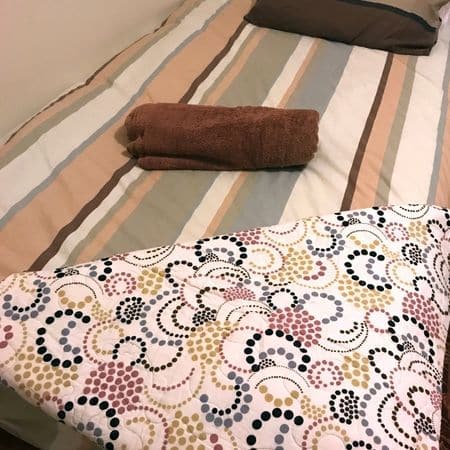
Last week, the generous Kogarah Quilters, who have been stitching together for over 10 years, donated 22 quilts to the Withdrawal centre – David Martin Place, which provides a 10-bed residential drug and alcohol withdrawal program for young people aged 16 – 24. Often, young people entering the centre arrive with little in the way of possessions, and these quilts have been a warm and welcoming gesture at a time when young people are beginning their treatment and recovery and are feeling anxious and unwell.
Supported by the Georges River Council, The Kogarah Quilters make their colourful quilts from donated fabric and donate them to various local charities, women’s refuges, mental health groups and other worthy recipients. Joan Carter, a member of the Kogarah Quilters, was introduced to Triple Care Farm by her son who was a member of the RAN and sailed with Royal Australian Navy Sailing Association (RANSA). The association has, for many years, raised funds for Sir David Martin Foundation.
Joan and the Quilters club were drawn towards helping Triple Care Farm, saying,
‘We were impressed by the fact that once young people have completed their time at the farm, they are supported in finding employment and accommodation as well.’
Prioritising safe and supported detox, the withdrawal program also involves 24/7 medical care, educational programs, and family support. With our young people’s wellbeing in mind, Joan and The Kogarah Quilters met twice a month to make and provide these comforting quilts for students to take as a reminder of their time at Triple Care Farm and the progress they have made. We thank Joan and the team for their committed support, kindness and help in brightening up our young people’s rooms as they embark on their journey to wellness.
Celebrating the resilience of young people

Understanding the current challenges facing young people is an important mission for the Foundation. Through dedicated members of our Youth Advisory Group – like Lincoln, we can gain insight into how young people are navigating the changing world on a local and global level, with strength and resilience.
Our Youth Advisory Group works towards shaping our call to action and our efforts to support youth in crisis, and through Lincoln’s story, Sir David Martin Foundation has expanded our voice and purpose.
Growing up in a small rural community heavily impacted by drugs, Lincoln witnessed first-hand the devastating results that substance abuse can have on a young person’s life and wellbeing. Lincoln has used his experiences and interest in prevailing political issues as motivation to provide support to young people nationally.
Starting his journey in the impact and advocacy space, Lincoln was a member of the inaugural United Nations Youth Australia Emerging Leaders Program, where his passion for assisting young people through addiction and substance misuse came to the fore. Lincoln was also a leader throughout his own education, in campaigning for equality and respect for his LGBTQIA+ peers.
Sir David Martin Foundation acknowledges Lincoln’s dedicated efforts and wide experience with helping young Australians and we are thrilled to have him as a part of our Youth Advisory Group. Lincoln is currently involved in Amnesty International Monash and will continue to advocate for a better future for our young Australians and help shape our voice to best meet the needs of youth in crisis.
Visit our Youth Advisory Group page to learn more about each of our members.
Representatives of the Youth Advisory Group will attend youth conferences and forums and report back to the Foundation.
Without a home
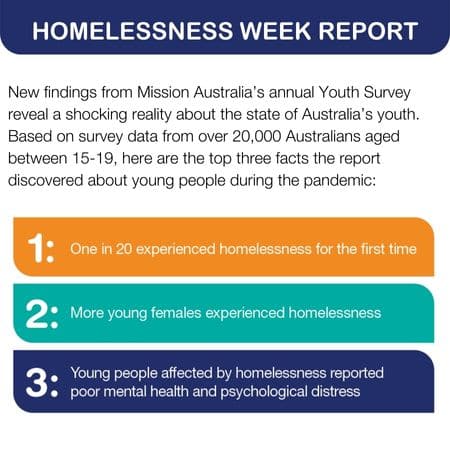
First-time youth homelessness in the COVID-19 period
The transition into adulthood can be a challenging time, but for many of Australia’s most vulnerable young people, homelessness and mental health concerns are additional pressure points.
The pandemic has added extra layers of disadvantage to young people who were already struggling.
Read the full report and find out how you can help end youth homelessness.

